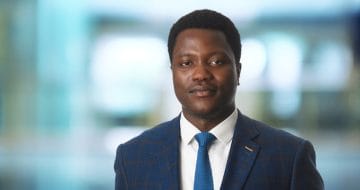White & Case’s Ryan Gawrych and Hannah Bragge unpack life in the firm’s busy Energy, Infrastructure, Project and Asset Finance team

As governments and industries around the world race to decarbonise, lawyers are increasingly needed to advise on the new technologies and innovative deal structures driving the energy transition forward. From financing battery storage facilities to advising on green hydrogen projects, White & Case’s global Energy, Infrastructure, Project and Asset Finance (EIPAF) practice group is helping make it all happen.
Ahead next week’s virtual student event, ‘Understanding key trends in the energy transition — with White & Case‘, we caught up with the speakers, local partner Ryan Gawrych and associate Hannah Bragge, to hear what it’s like to work at the forefront of the energy transition.
Can you tell us a bit about your career journeys so far and what your day-to-day looks like in the EIPAF team at White & Case?
Bragge: I’m originally from Australia and started out at a different firm back home, but I’ve been with White & Case for a few years now, first in the Melbourne office, and more recently in London since August 2023. I focus mostly on project finance, especially in the renewables space, but I’ve also had great exposure to project development work, both at my previous firm and here at White & Case. One of the real strengths of our London team is that juniors and trainees get to work across both the financing and development sides of transactions. That kind of experience early on is really valuable for building a successful career.
Gawrych: Like Hannah, I’m Australian too, and I’ve had a bit of a global journey. I’ve worked in Australia, China, Mongolia, Indonesia, the UAE, the UK and now Germany. I’ve been with White & Case for just over two years and have a background that includes time at major resources companies and other international law firms. My practice is more focused on project development, commercial contracts, and M&A within the energy sector. That’s also what prompted my recent relocation to White & Case’s Hamburg office. I’m advising on low-carbon fuel projects across Europe, and Germany is right at the centre of a lot of the action.
What attracted you to this sector? What do you enjoy most about working on energy transition deals?
Bragge: It’s a mix of things. First, it’s just where the work is — this is where our clients are investing and building right now. But it’s also genuinely interesting. You’re dealing with emerging technologies, which means lenders aren’t always familiar with the risk profiles. A good example is batteries. They’re essential for balancing the grid, but the way they generate revenue differs from market to market and keeps changing. So, there’s a lot of creative legal thinking required. There’s definitely no copy-paste approach here. And personally, I find it exciting to be working on projects that are pushing the boundaries of what’s possible.
Gawrych: I’ve been working in the energy sector for quite a while. My career started in mining and oil & gas, especially advising Asian investors in Australian projects. But over the past seven or eight years, the global energy system has been undergoing a huge transformation. The shift away from fossil fuels is driven by everything from the Paris Climate Accords to energy security concerns. Working with big energy clients as they pivot towards renewables and new business models has been fascinating. You’re dealing with projects that have never been done before, or trying to apply lessons from one jurisdiction — say, a hydrogen project in Saudi Arabia — to a totally different legal and commercial context, like France or Germany. It’s blue-sky thinking, and it keeps things interesting.
Have you noticed changes in the market recently, especially with global elections and policy shifts?
Gawrych: While some headlines might suggest a general slowdown in the market, we’re seeing more of a recalibration, with the overall fundamentals remaining solid.
In Europe, there’s still a strong policy drive behind decarbonisation, and building new energy infrastructure remains a top political priority. But as governments are being put under increasing pressure to reallocate funding to defence and other nearshoring initiatives, we’re also seeing regulators and investors apply a higher degree of scrutiny to deal certainty and value for money. The result is a shift away from speculative technologies and structures, toward more mature and commercially viable projects. In the Middle East, we are seeing a slight slowdown in new project announcements, as developers wait to see how other markets play out following recent elections. However, the overall policy focus on the energy transition remains strong.
In the Americas, while there appears to be a policy shift away from renewables in the US, there’s still a lot happening in the energy transition space in relation to sustainable technologies like carbon capture and storage (i.e. things that reduce emissions but don’t necessarily fall under the ‘renewables’ label). And in Asia Pacific, investment in new technologies is also going strong, in particular, in green hydrogen, ammonia, and sustainable aviation fuel. There’s also a lot of innovation coming out of the region around electrification and low-carbon fuels.
It sounds like a global and evolving landscape. What skills do aspiring lawyers need to thrive in this sector — and what should they be doing now to prepare?
Bragge: I think one of the biggest things to understand is that this area of law probably isn’t something you’ll study much at university, if at all. So, if you’re interested in it, you’ve got to be proactive. Read the Financial Times and The Economist. Follow project developers and green investors on LinkedIn to see how they are implementing the latest renewables, energy storage, and low-carbon technologies. White & Case publishes a lot of great materials on the intersection between the legal profession and the energy transitions that you should check-out, but there’s also plenty of other accessible content out there from other international law firms and legal commentators.
When you come into a transactional team like ours, you’ll be learning core legal skills like drafting and managing deal processes, but in our space, a broader awareness of the market really enhances the experience. And it helps you figure out if this work genuinely interests you. If you find yourself reading about a battery storage deal and thinking, “That’s cool, I want to know more,” then that’s a great sign.
Gawrych: I’d echo that. Our group probably has one of the steepest learning curves at the firm; not necessarily on the technical legal side, but in terms of understanding the industries we work in. You need to be curious. If you hear someone mention the HEFA process or green ammonia, and you’ve never come across those terms before, the instinct should be to go away, do some research, and get up to speed. That’s how you build context, which is crucial for our work. These are billion-dollar projects with huge moving parts, from engineering to policy to economics. You don’t have to be an expert from day one, and really our expertise will always be focussed on the law, but having a genuine interest and a willingness to learn about the industries that our clients operate in makes a huge difference.
And finally, what advice would you give students who are looking at firms like White & Case and thinking, ‘I want to be doing this kind of work’?
Bragge: Be curious, be informed, and don’t be afraid to ask questions. If you’re applying to White & Case, show that you understand what the firm actually does. We’re known for cross-border transactional work and complex infrastructure deals. If you’re passionate about global issues, climate change, or the energy sector, say so. And remember, everyone starts somewhere — you’re not expected to know everything, but showing a willingness to learn goes a long way.
Gawrych: I’d say embrace the complexity. It’s what makes the work challenging, but also what makes it rewarding. If you’re someone who likes puzzles, figuring out how different legal, commercial and technical elements all fit together, then this is a great place to be. And at White & Case, you’ll have opportunities to work on projects all over the world. That global perspective is baked into our culture and our deals, and it creates a really exciting environment to build your career. You do really need to get in there, lift up the bonnet, get stuck into the engine, and play around.
Join us on Wednesday 16 April for ‘Understanding key trends in the energy transition’, a virtual student event with global law firm White & Case. Apply now.
About Legal Cheek Careers posts.


